| Last Modified: 11-20-2023 | 6.11:8.1.0 | Doc ID: RM100000001SZEH |
| Model Year Start: 2020 | Model: Camry | Prod Date Range: [09/2019 - ] |
| Title: METER / GAUGE / DISPLAY: METER / GAUGE SYSTEM: Speed Signal Circuit; 2020 - 2024 MY Camry [09/2019 - ] | ||
|
Speed Signal Circuit |
DESCRIPTION
The combination meter assembly receives the vehicle speed signal from this circuit. The wheel speed sensors produce an output that varies according to the vehicle speed. The wheel speed sensor output is received by the skid control ECU (brake actuator assembly) which uses this information to create the vehicle speed signal*. The vehicle speed signal consists of pulses sent to the combination meter assembly from the skid control ECU (brake actuator assembly). To create this signal, 12 V is output from IG2 which is behind a resistor in the combination meter assembly. This voltage is sent to the skid control ECU (brake actuator assembly). The pulse signal is created by switching the transistor in the skid control ECU (brake actuator assembly) on and off, making the voltage on the wire drop to 0 V. A similar system is used for the output of this signal from the combination meter assembly via terminal +S. A voltage of 12 V is applied to terminal +S from each ECU or relay that is connected to this terminal. The transistor in the combination meter assembly is controlled by the signal from the skid control ECU (brake actuator assembly). When this transistor is turned on, this transistor makes the voltage supplied by the various ECUs (via their respective internal resistors) drop to 0 V. Each ECU connected to terminal +S of the combination meter assembly controls its respective system based on this pulse signal.
- *: This vehicle speed signal is created by the skid control ECU (brake actuator assembly). There is no actual component that is referred to as the vehicle speed sensor. In addition, for some systems, vehicle speed information may be received via CAN communication.
HINT:
This circuit is used for the systems connected to terminal +S. This signal is not used for combination meter assembly operation. Combination meter assembly components such as the speedometer operate using data received via CAN communication.
WIRING DIAGRAM
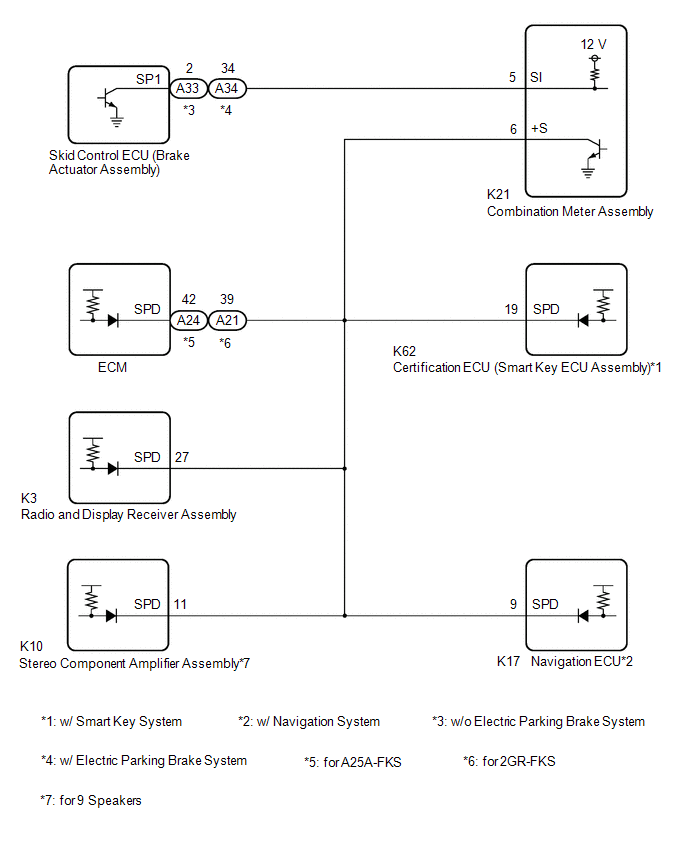
CAUTION / NOTICE / HINT
NOTICE:
- When replacing the combination meter assembly, always replace it with a new one. If a combination meter assembly which was installed to another vehicle is used, the information stored in it will not match the information from the vehicle and a DTC may be stored.
-
Before replacing the ECM, certification ECU (smart key ECU assembly)* or DCM (telematics transceiver)* refer to Registration.
w/ Smart Key System: Click here
![2020 - 2022 MY Camry [09/2019 - 08/2022]; THEFT DETERRENT / KEYLESS ENTRY: SMART KEY SYSTEM (for Start Function): REGISTRATION](/t3Portal/stylegraphics/info.gif)
![2023 - 2024 MY Camry [08/2022 - ]; THEFT DETERRENT / KEYLESS ENTRY: SMART KEY SYSTEM (for Start Function): REGISTRATION](/t3Portal/stylegraphics/info.gif)
w/o Smart Key System: Click here
![2020 - 2024 MY Camry [09/2019 - ]; THEFT DETERRENT / KEYLESS ENTRY: IMMOBILISER SYSTEM (w/o Smart Key System): REGISTRATION](/t3Portal/stylegraphics/info.gif)
- *: w/ Smart Key System
PROCEDURE
|
1. |
INSPECT ECU TERMINAL VOLTAGE (INPUT VOLTAGE) |
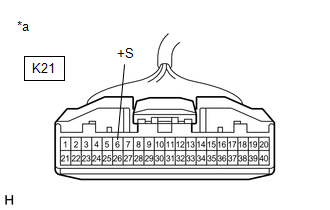
|
*a |
Front view of wire harness connector (to Combination Meter Assembly) |
(a) Disconnect the K21 combination meter assembly connector.
(b) Measure the voltage according to the value(s) in the table below.
Standard Voltage:
|
Tester Connection |
Condition |
Specified Condition |
|---|---|---|
|
K21-6 (+S) - Body ground |
Ignition switch ON |
11 to 14 V |
HINT:
If any of the ECUs specified in the wiring diagram supplies power to the combination meter assembly, the combination meter assembly will output a waveform.
| NG |

|
|
|
2. |
CONFIRM MODEL |
(a) Choose the model to be inspected.
|
Result |
Proceed to |
|---|---|
|
w/o Electric Parking Brake System |
A |
|
w/ Electric Parking Brake System |
B |
| B |

|
|
|
3. |
INSPECT COMBINATION METER ASSEMBLY (OUTPUT VOLTAGE) |
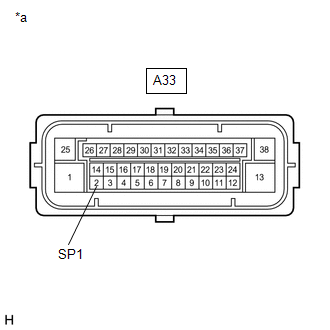
|
*a |
Front view of wire harness connector (to Skid Control ECU (Brake Actuator Assembly)) |
(a) Connect the K21 combination meter assembly connector.
(b) Disconnect the A33 skid control ECU (brake actuator assembly) connector.
(c) Measure the voltage according to the value(s) in the table below.
Standard Voltage:
|
Tester Connection |
Condition |
Specified Condition |
|---|---|---|
|
A33-2 (SP1) - Body ground |
Ignition switch ON |
11 to 14 V |
| NG |

|
|
|
4. |
INSPECT SKID CONTROL ECU (BRAKE ACTUATOR ASSEMBLY) (INPUT WAVEFORM) |
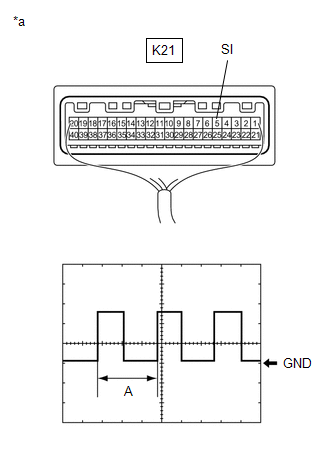
|
*a |
Component with harness connected (Combination Meter Assembly) |
(a) Check the input waveform.
(1) Connect the A33 skid control ECU (brake actuator assembly) connector.
(2) Remove the combination meter assembly with the connector(s) still connected.
(3) Connect an oscilloscope to terminal K21-5 (SI) and body ground.
(4) Turn the ignition switch to ON.
(5) Turn a wheel slowly.
(6) Check the signal waveform according to the condition(s) in the table below.
|
Item |
Condition |
|---|---|
|
Tester connection |
K21-5 (SI) - Body ground |
|
Tool setting |
5 V/DIV., 20 ms./DIV. |
|
Condition |
Ignition switch ON, wheel being rotated |
OK:
The waveform is similar to that shown in the illustration.
HINT:
When the system is functioning normally, one wheel revolution generates 4 pulses. As the vehicle speed increases, the width indicated by (A) in the illustration narrows.
| OK |

|
| NG |

|
|
5. |
CHECK HARNESS AND CONNECTOR (SKID CONTROL ECU (BRAKE ACTUATOR ASSEMBLY) - COMBINATION METER ASSEMBLY) |
(a) Disconnect the K21 combination meter assembly connector.
(b) Measure the resistance according to the value(s) in the table below.
Standard Resistance:
|
Tester Connection |
Condition |
Specified Condition |
|---|---|---|
|
A33-2 (SP1) - K21-5 (SI) |
Always |
Below 1 Ω |
|
A33-2 (SP1) or K21-5 (SI) - Body ground |
Always |
10 kΩ or higher |
| OK |

|
| NG |

|
REPAIR OR REPLACE HARNESS OR CONNECTOR |
|
6. |
INSPECT COMBINATION METER ASSEMBLY (OUTPUT VOLTAGE) |
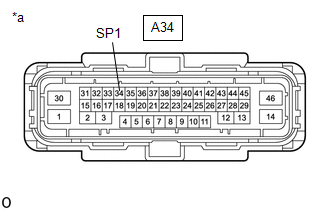
|
*a |
Front view of wire harness connector (to Skid Control ECU (Brake Actuator Assembly)) |
(a) Connect the K21 combination meter assembly connector.
(b) Disconnect the A34 skid control ECU (brake actuator assembly) connector.
(c) Measure the voltage according to the value(s) in the table below.
Standard Voltage:
|
Tester Connection |
Condition |
Specified Condition |
|---|---|---|
|
A34-34 (SP1) - Body ground |
Ignition switch ON |
11 to 14 V |
| NG |

|
|
|
7. |
INSPECT SKID CONTROL ECU (BRAKE ACTUATOR ASSEMBLY) (INPUT WAVEFORM) |

|
*a |
Component with harness connected (Combination Meter Assembly) |
(a) Check the input waveform.
(1) Connect the A34 skid control ECU (brake actuator assembly) connector.
(2) Remove the combination meter assembly with the connector(s) still connected.
(3) Connect an oscilloscope to terminal K21-5 (SI) and body ground.
(4) Turn the ignition switch to ON.
(5) Turn a wheel slowly.
(6) Check the signal waveform according to the condition(s) in the table below.
|
Item |
Condition |
|---|---|
|
Tester connection |
K21-5 (SI) - Body ground |
|
Tool setting |
5 V/DIV., 20 ms./DIV. |
|
Condition |
Ignition switch ON, wheel being rotated |
OK:
The waveform is similar to that shown in the illustration.
HINT:
When the system is functioning normally, one wheel revolution generates 4 pulses. As the vehicle speed increases, the width indicated by (A) in the illustration narrows.
| OK |

|
| NG |

|
|
8. |
CHECK HARNESS AND CONNECTOR (SKID CONTROL ECU (BRAKE ACTUATOR ASSEMBLY) - COMBINATION METER ASSEMBLY) |
(a) Disconnect the K21 combination meter assembly connector.
(b) Measure the resistance according to the value(s) in the table below.
Standard Resistance:
|
Tester Connection |
Condition |
Specified Condition |
|---|---|---|
|
A34-34 (SP1) - K21-5 (SI) |
Always |
Below 1 Ω |
|
A34-34 (SP1) or K21-5 (SI) - Body ground |
Always |
10 kΩ or higher |
| OK |

|
| NG |

|
REPAIR OR REPLACE HARNESS OR CONNECTOR |
|
9. |
CHECK HARNESS AND CONNECTOR (EACH ECU - COMBINATION METER ASSEMBLY) |
(a) Disconnect the A24 ECM*1 connector.
(b) Disconnect the A21 ECM*2 connector.
(c) Disconnect the K3 radio and display receiver assembly connector.
(d) Disconnect the K62 certification ECU (smart key ECU assembly)*3 connector.
(e) Disconnect the K10 stereo component amplifier assembly*4 connector.
(f) Disconnect the K17 navigation ECU*5 connector.
(g) Measure the resistance according to the value(s) in the table below.
Standard Resistance:
|
Tester Connection |
Condition |
Specified Condition |
|---|---|---|
|
K21-6 (+S) - Body ground |
Always |
10 kΩ or higher |
(h) Connect the A24 ECM*1 connector.
(i) Connect the A21 ECM*2 connector.
(j) Connect the K3 radio and display receiver assembly connector.
(k) Connect the K62 certification ECU (smart key ECU assembly)*3 connector.
(l) Connect the K10 stereo component amplifier assembly*4 connector.
(m) Connect the K17 navigation ECU*5 connector.
- *1: for A25A-FKS
- *2: for 2GR-FKS
- *3: w/ Smart Key System
- *4: for 9 Speakers
- *5: w/ Navigation System
| NG |

|
REPAIR OR REPLACE HARNESS OR CONNECTOR |
|
|
10. |
CONFIRM MODEL |
(a) Choose the model to be inspected.
|
Result |
Proceed to |
|---|---|
|
w/ Smart Key System |
A |
|
w/o Smart Key System |
B |
| B |

|
|
|
11. |
INSPECT CERTIFICATION ECU (SMART KEY ECU ASSEMBLY) (SHORT CIRCUIT IN CERTIFICATION ECU (SMART KEY ECU ASSEMBLY)) |
(a) Disconnect the K62 certification ECU (smart key ECU assembly) connector.
(b) Measure the voltage according to the value(s) in the table below.
Standard Voltage:
|
Tester Connection |
Condition |
Specified Condition |
|---|---|---|
|
K21-6 (+S) - Body ground |
Ignition switch ON |
4.5 to 14 V |
HINT:
If the result is as specified, there may be a short circuit in the certification ECU (smart key ECU assembly).
| OK |

|
|
|
12. |
CONFIRM MODEL |
(a) Choose the model to be inspected.
|
Result |
Proceed to |
|---|---|
|
for 9 Speakers |
A |
|
except 9 Speakers |
B |
| B |

|
|
|
13. |
INSPECT STEREO COMPONENT AMPLIFIER ASSEMBLY (SHORT CIRCUIT IN STEREO COMPONENT AMPLIFIER ASSEMBLY) |
(a) Disconnect the K10 stereo component amplifier assembly connector.
(b) Measure the voltage according to the value(s) in the table below.
Standard Voltage:
|
Tester Connection |
Condition |
Specified Condition |
|---|---|---|
|
K21-6 (+S) - Body ground |
Ignition switch ON |
4.5 to 14 V |
HINT:
If the result is as specified, there may be a short circuit in the stereo component amplifier assembly.
| OK |

|
|
|
14. |
CONFIRM MODEL |
(a) Choose the model to be inspected.
|
Result |
Proceed to |
|---|---|
|
w/ Navigation System |
A |
|
w/o Navigation System |
B |
| B |

|
|
|
15. |
INSPECT NAVIGATION ECU (SHORT CIRCUIT IN NAVIGATION ECU) |
(a) Disconnect the K17 navigation ECU connector.
(b) Measure the voltage according to the value(s) in the table below.
Standard Voltage:
|
Tester Connection |
Condition |
Specified Condition |
|---|---|---|
|
K21-6 (+S) - Body ground |
Ignition switch ON |
4.5 to 14 V |
HINT:
If the result is as specified, there may be a short circuit in the navigation ECU.
| OK |

|
|
|
16. |
INSPECT RADIO AND DISPLAY RECEIVER ASSEMBLY (SHORT CIRCUIT IN RADIO AND DISPLAY RECEIVER ASSEMBLY) |
(a) Disconnect the K3 radio and display receiver assembly connector.
(b) Measure the voltage according to the value(s) in the table below.
Standard Voltage:
|
Tester Connection |
Condition |
Specified Condition |
|---|---|---|
|
K21-6 (+S) - Body ground |
Ignition switch ON |
4.5 to 14 V |
HINT:
If the result is as specified, there may be a short circuit in the radio and display receiver assembly.
| OK |

|
| NG |

|
REPLACE ECM |
|
|
|
